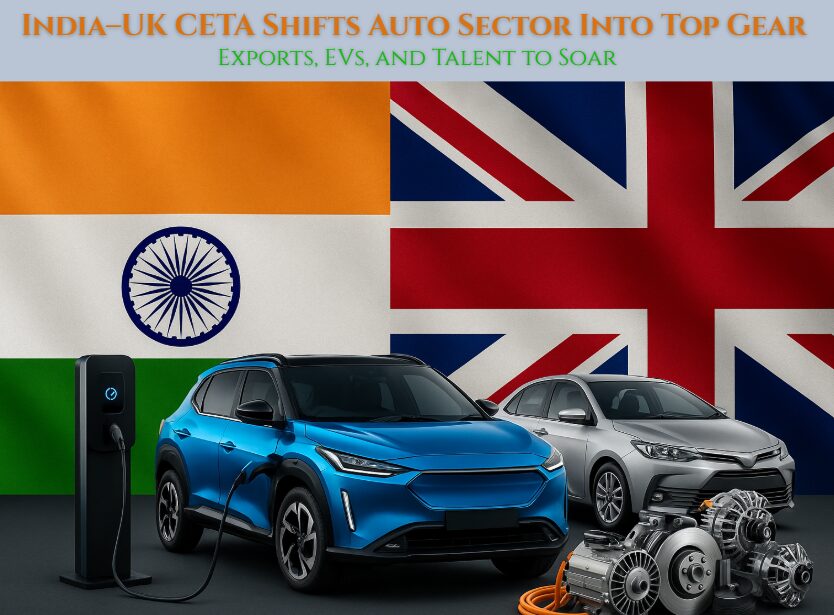Overview (4 Fast Takeaways):
- Duty-free access for 99% of Indian exports to the UK, including auto and EV parts
- Professional mobility gets easier for Indian auto engineers and R&D talent
- EV startups and MSMEs can scale faster through exports and joint ventures
- Green mobility, precision parts, and clean energy become major trade focuses
Intro: A Trade Deal That’s More Than Just Numbers
When India and the UK shook hands on the Comprehensive Economic and Trade Agreement (CETA), it wasn’t just about boosting trade—it was about creating new lanes for innovation, jobs, and global partnerships.
Signed by India’s Commerce Minister Piyush Goyal and the UK’s Jonathan Reynolds, this deal promises to transform how Indian automotive companies—from giants like Mahindra to nimble EV startups—engage with the British market.
For an industry already revving toward green mobility, this pact is the turbo boost it didn’t know it needed.
Duty-Free Highway for Auto Components
Under CETA, 99% of Indian exports to the UK now enjoy tariff-free access—and that includes auto components, EV sub-assemblies, and engineered parts.
This opens up huge potential for Indian manufacturers to expand in one of Europe’s most sophisticated automotive markets. No more price penalties at British ports—just clean, open roads for business.
“This is a transformative moment,” said Dr. Anish Shah, MD & CEO of Mahindra Group. “It will help create high-quality jobs and drive growth in future-friendly industries like green mobility.”
EV Startups and MSMEs Go Global
Electric vehicle startups now have the green light to enter new markets and even form partnerships or joint ventures with UK-based players.
Micro, small, and medium enterprises (MSMEs), which often face hurdles in global trade, now get a chance to scale up with reduced regulatory stress and better market access.
From battery tech innovators to lightweight material suppliers, CETA gives them a seat at the global table.
Professionals, Start Your Engines
It’s not just about products—it’s about people. Indian engineers, R&D experts, and auto designers will now benefit from simplified visa rules and a waiver on double social security contributions for up to three years.
This allows Indian auto firms to send teams to the UK for collaboration, innovation, or client projects—without burning a hole in their budgets or dealing with red tape.
Precision, Sustainability, and Smarter Trade
India’s focus on sustainable manufacturing and smart mobility finds perfect synergy with the UK’s eco-focused policies.
From clean energy collaboration to hydrogen fuel technology and precision engineering, the deal covers areas that are vital to India’s mobility transition.
The trade agreement also streamlines customs processes and regulatory frameworks—cutting downtime and uncertainty for exporters.
Why This Matters to the Auto Industry
The UK remains one of the most advanced automotive markets globally. So why does CETA matter?
- Big players like Mahindra, Tata, and TVS can explore deeper partnerships and new consumer segments
- Small businesses and Tier-2 suppliers can scale exports of auto electronics, sensors, wiring harnesses, and EV control units
- EV startups get access to British consumers, investors, and tech collaborations through JV opportunities
- Workforce integration will drive quicker innovation with real-time knowledge exchange
What Else Is Included?
- Simplified visa & work processes for automotive professionals
- Reduced trade barriers and quicker, cleaner customs operations
- Collaboration in clean energy, hydrogen fuel cells, and green materials
- Better regulatory frameworks to promote sustainable and smart manufacturing
This goes beyond just wheels and steel—it’s a full-spectrum upgrade for Indian mobility’s global standing.
Summary Table
| What’s Changing? | How It Helps Indian Auto Sector |
|---|---|
| 99% tariff-free exports | Higher profit margins for auto parts, EV tech, and components in the UK |
| Work visa & social security benefits | Easier, cheaper deployment of Indian engineers and R&D teams to UK projects |
| Focus on MSMEs and EV startups | Smoother scaling, JV creation, and export access to a mature global market |
| Green tech and innovation push | Opportunities in clean energy, hydrogen, lightweight materials, and digital mobility |
Conclusion: From Blueprint to Breakthrough
The India–UK CETA is more than just a trade deal—it’s a roadmap for the next chapter in Indian automotive growth. By opening doors to a global hub like the UK, it helps India go from an exporter of parts to a partner in mobility innovation.
Whether it’s MSMEs dreaming big, EV startups hunting for their next big move, or designers heading to London, this deal empowers every link in the auto chain.
India’s roads may lead to the UK—but the bigger journey is toward a greener, smarter, and more connected future.

